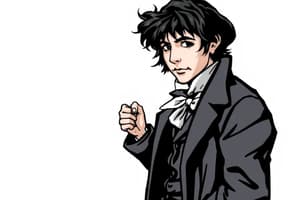Podcast
Questions and Answers
What is the primary function of the workhouse described in the passage?
What is the primary function of the workhouse described in the passage?
- To function as a school for orphaned children.
- To serve as a place of employment for the townspeople.
- To provide medical care for the sick.
- To offer shelter and support for impoverished individuals. (correct)
What observation made by the doctor indicates the mother's social status or condition?
What observation made by the doctor indicates the mother's social status or condition?
- Her shoes had holes. (correct)
- Her beauty.
- Her expensive clothing.
- Her youthfulness.
How does the passage suggest the mother of Oliver Twist arrived at the workhouse?
How does the passage suggest the mother of Oliver Twist arrived at the workhouse?
- She was brought there against her will by town officials.
- She walked to the workhouse seeking assistance. (correct)
- She was born there.
- She arrived in a carriage seeking medical attention.
What can be inferred from the doctor's statement, 'She wasn't married'?
What can be inferred from the doctor's statement, 'She wasn't married'?
What is the significance of the location where Oliver Twist was born?
What is the significance of the location where Oliver Twist was born?
What is the initial interaction between Oliver's mother and the doctor like?
What is the initial interaction between Oliver's mother and the doctor like?
How does the old woman's reaction to the mother's death contrast with the doctor's?
How does the old woman's reaction to the mother's death contrast with the doctor's?
What does the phrase 'Oliver asks for more' suggest about the story's potential themes?
What does the phrase 'Oliver asks for more' suggest about the story's potential themes?
What is the role of the old woman in the initial scene?
What is the role of the old woman in the initial scene?
What atmosphere is conveyed through the description of the workhouse?
What atmosphere is conveyed through the description of the workhouse?
What is implied by the mother's desire to see the child before she dies?
What is implied by the mother's desire to see the child before she dies?
The doctor's observation, 'The usual story,' suggests what about the circumstances of women in this setting?
The doctor's observation, 'The usual story,' suggests what about the circumstances of women in this setting?
What does the setting of the story in a town in England during the time of workhouses suggest about the socio-economic conditions?
What does the setting of the story in a town in England during the time of workhouses suggest about the socio-economic conditions?
What is the significance of the mother pressing her cold, white lips to the child's face?
What is the significance of the mother pressing her cold, white lips to the child's face?
What is the doctor's primary concern when he asks, 'Where did she come from?'
What is the doctor's primary concern when he asks, 'Where did she come from?'
What does the detail about the mother's shoes having holes suggest about her journey to the workhouse?
What does the detail about the mother's shoes having holes suggest about her journey to the workhouse?
How does the dialogue contribute to the reader's understanding of the characters?
How does the dialogue contribute to the reader's understanding of the characters?
How does the doctor's use of the phrase 'Good night!' at the end of the scene contribute to the overall tone?
How does the doctor's use of the phrase 'Good night!' at the end of the scene contribute to the overall tone?
How does the author create a sense of foreboding in the initial scene?
How does the author create a sense of foreboding in the initial scene?
What is the overarching thematic concern that the initial setting and characters suggest to the reader?
What is the overarching thematic concern that the initial setting and characters suggest to the reader?
Flashcards
Workhouse
Workhouse
A place in England where poor people with no money and nowhere to live stayed.
Oliver
Oliver
The first name given to the baby born in the workhouse.
Who was present at Oliver's birth?
Who was present at Oliver's birth?
A doctor and an old woman were present.
What was the marital status of Oliver's mother?
What was the marital status of Oliver's mother?
Signup and view all the flashcards
Where was Oliver born?
Where was Oliver born?
Signup and view all the flashcards
Study Notes
- The story "Oliver Asks for More" by Charles Dickens takes place in a town in England.
- In this town, among other buildings, was a workhouse.
- A workhouse was a house for poor people who had no money and nowhere to live.
- Oliver Twist was born in a workhouse.
- Oliver's young mother was ill in bed when he was born.
- A doctor and old woman stood by her side.
- Oliver's mother lifted her head from the pillow and asked to see the child before she died.
- The doctor told her not to talk about dying, and the old woman said she was too young to die.
- The young woman shook her head and held out her hand towards the child.
- The doctor put the child in her arms.
- Oliver's mother pressed her cold, white lips to the child's face and then fell back.
- The doctor then stated that she was dead.
- The old woman took the child away from his dead mother, calling the mother "poor dear."
- The doctor remarked that she was a good-looking girl and asked where she came from as he put on his hat and gloves.
- According to the old woman, she was brought there the night before and had been lying in the street.
- She had walked a long way, and her shoes had holes in them.
- Nobody knew where she came from or where she was going.
- The doctor raised the dead woman's left hand.
- He said it was the usual story and that she had no ring on her finger, so she wasn't married, and then he said goodnight.
Studying That Suits You
Use AI to generate personalized quizzes and flashcards to suit your learning preferences.




